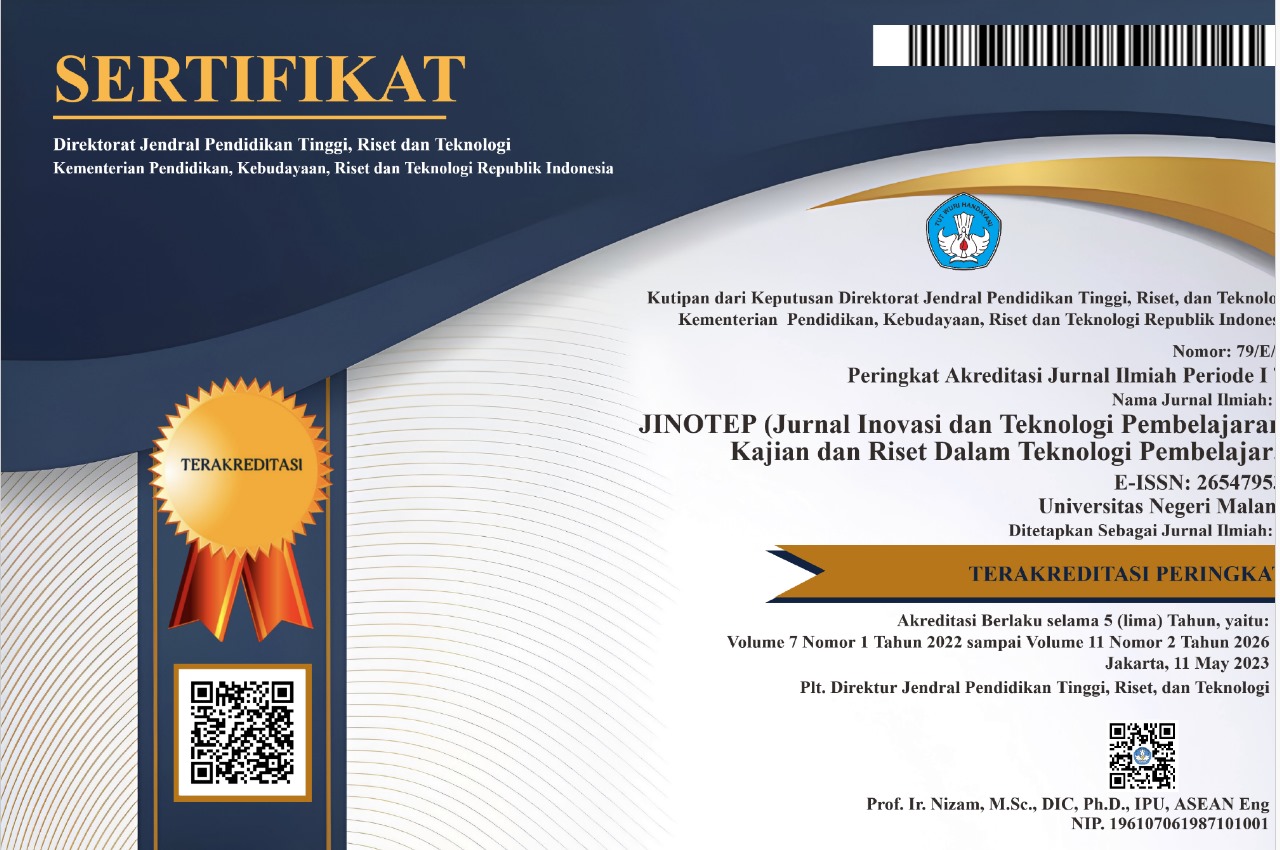Efektivitas Model Pembelajaran Berbasis Proyek Terhadap Keaktifan dan Kemampuan Mahasiswa
Abstract
Abstrak: Penelitian ini bertujuan untuk mengetahui efektivitas pembelajaran berbasis proyek dalam meningkatkan aktivitas dan kemampuan mahasiswa. Metode penelitian yang digunakan adalah Weak Experimental dengan desain One Group Pretest – Posttest yang dilakukan kepada mahasiswasemester lima pada mata kuliah Sanitasi Industri, Program studi Teknologi Hasil Pertanian. Pengumpulan data menggunakan instrument tes dan angket. Analisis data dilakukan dengan analisis deskriptif. Hasil penelitian menunjukkan bahwa kemampuan mahasiswa meningkat berdasarkan n-gain rata-rata kelas yang masuk dalam kriteria sedang sebesar 0,39. Tanggapan mahasiswa terhadap pembelajaran berbasis proyek termasuk kedalam kriteria sangat tertarik (94,92%) dengan persentase sangat setuju 30,98% dan setuju 63,93%. Metode pembelajaran berbasis proyek efektif dalam meningkatkan aktivitas dan kemampuan mahasiswa pada mata kuliah Sanitasi Industri.
Abstract: This study aims to determine the effectiveness of project-based learning in increasing student activities and abilities. The research method used is Weak Experimental with the design of One Group Pretest – Posttest which is carried out to fifth semester students in the Industrial Sanitation course, Agricultural Product Technology Study Program. Collecting data using test instruments and questionnaires. Data analysis was done by descriptive analysis. The results showed that the student's ability increased based on the n-gain average class that was included in the moderate criteria of 0.39. Student responses to project-based learning were included in the criteria for being very interested (94.92%) with the percentage strongly agreeing 30.98% and agreeing 63.93%. Project-based learning methods are effective in increasing student activities and abilities in Industrial Sanitation courses.
Keywords
Full Text:
PDFReferences
Aranzabal, A., Epelde, E., & Artetxe, M. (2022). Team formation on the basis of Belbin’s roles to enhance students’ performance in project based learning. Education for Chemical Engineers, 38(December 2020), 22–37. https://doi.org/10.1016/j.ece.2021.09.001
Baidowi, A., Sumarmi, S., & Amirudin, A. (2015). Pengaruh Model Pembelajaran Berbasis Proyek terhadap Kemampuan Menulis Karya Ilmiah Geografi Siswa SMA. Jurnal Pendidikan Geografi, 20(1), 48–58. https://doi.org/10.17977/um017v20i12015p048
Barak, M. (2020). Problem-, Project- and Design-Based Learning: Their Relationship to Teaching Science, Technology and Engineering in School. Journal of Problem-Based Learning, 7(2), 94–97. https://doi.org/10.24313/jpbl.2020.00227
Bararah, I. (2017). Efektifitas Perencanaan Pembelajaran dalam Pembelajaran Pendidikan Agama Islam di Sekolah. Jurnal MUDARRISUNA, 7(1), 131–147.
Bell, S. (2010). Project-Based Learning for the 21st Century: Skills for the Future. The Clearing House: A Journal of Educational Strategies, Issues and Ideas, 83(2), 39–43. https://doi.org/10.1080/00098650903505415
Beneroso, D., & Robinson, J. (2022). Online project-based learning in engineering design: Supporting the acquisition of design skills. Education for Chemical Engineers, 38(October 2021), 38–47. https://doi.org/10.1016/j.ece.2021.09.002
Cook, N.D., & Weaver, G. C. (2015). Teachers’ Implementation of Project-Based Learning: Lessons from the Research Goes to School Program. Journal Of Science Education, 19(6), 2–44.
Culclasure, B. T., Longest, K. C., & Terry, T. M. (2019). Project-Based Learning (Pjbl) in Three Southeastern Public Schools: Academic, Behavioral, and Social-Emotional Outcomes. Interdisciplinary Journal of Problem-Based Learning, 13(2), 8–30.
Darmawan, A. (2020). The Influence of Project Based Learning Model on Student Writing Skills. Jurnal Pena Sains, 7(2), 113–119. https://doi.org/10.2991/assehr.k.200824.012
Edmunds, J., Arshavsky, N., Glennie, E., Charles, K., & Rice, O. (2017). The relationship between project-based learning and rigor in STEM-focused high schools. Interdisciplinary Journal of Problem-Based Learning, 11(1), 1–6. https://doi.org/10.7771/1541-5015.1618
Fraenkel, J. R., Wallen, N. E., & Hyun, H. H. (2012). How to Design and Evaluate Research in Education (Eight Edit). New York: Mc Graw Hill.
Graham, R. (2017). The global state-of-the-art in engineering education Outcomes of Phase 1 benchmarking study. Massachusetts, USA. Retrieved from https://rhgraham.org/resources/Phase-1-engineering-education-benchmarking-study-2017.pdf
Guo, P., Saab, N., Post, L. S., & Admiraal, W. (2020). A review of project-based learning in higher education: Student outcomes and measures. International Journal of Educational Research, 102(November 2019), 101586.
https://doi.org/10.1016/j.ijer.2020.101586
Gurses, A., Dogar, C., & Geyik, E. (2015). Teaching of the Concept of Enthalpy Using Problem Based Learning Approach. Procedia - Social and Behavioral Sciences, 197(February), 2390–2394. https://doi.org/10.1016/j.sbspro.2015.07.298
Habók, A., & Nagy, J. (2016). In-service teachers’ perceptions of project-based learning. Springer Plus, 5(1), 1–14. https://doi.org/10.1186/s40064-016-1725-4
Hake, R. R. (1998). Interactive-engagement versus traditional methods: A six-thousand-student survey of mechanics test data for introductory physics courses. American Journal of Physics, 66(1), 64–74. https://doi.org/10.1119/1.18809
Han, S., Yalvac, B., Capraro, M. M., & Capraro, R. M. (2015). In-service teachers’ implementation and understanding of STEM project based learning. Eurasia Journal of Mathematics, Science and Technology Education, 11(1), 63–76. https://doi.org/10.12973/eurasia.2015.1306a
Idkhan, A. M. (2017). Analisis Model Pembelajaran Berbasis Proyek pada Mata Kuliah Kewirausahaan di Perguruan Tinggi. Seminar Nasional Lembaga Penelitian UNM, 2(1), 66–68.
Inayah, Z., Buchori, A., & Pramasdyahsari, A. S. (2021). The Effectiveness Of Problem Based Learning (Pbl) And Project Based Learning (Pjbl) Assisted Kahoot Learning Models On Student Learning Outcomes. International Journal of Research in Education, 1(2), 129–137. https://doi.org/10.26877/ijre.v1i2.8630
Johnson, B., & Ulseth, R. (2016). Development of professional competency through professional identity formation in a PBL curriculum. Proceedings - Frontiers in Education Conference, FIE, 2016-Novem. https://doi.org/10.1109/FIE.2016.7757387
Maros, M., Korenkova, M., Fila, M., Levicky, M., & Schoberova, M. (2021). Project-based learning and its effectiveness: evidence from Slovakia. Interactive Learning Environments, 0(0), 1–9. https://doi.org/10.1080/10494820.2021.1954036
Musa, F., Mufti, N., Latiff, R. A., & Amin, M. M. (2011). Project-based learning: Promoting meaningful language learning for workplace skills. Procedia - Social and Behavioral Sciences, 18, 187–195. https://doi.org/10.1016/j.sbspro.2011.05.027
Musa, F., Mufti, N., Latiff, R. A., & Amin, M. M. (2012). Project-based Learning (PjBL): Inculcating Soft Skills in 21st Century Workplace. Procedia - Social and Behavioral Sciences, 59(2006), 565–573. https://doi.org/10.1016/j.sbspro.2012.09.315
Parrado-Martínez, P., & Sánchez-Andújar, S. (2020). Development of competences in postgraduate studies of finance: A project-based learning (PBL) case study. International Review of Economics Education, 35(March).
https://doi.org/10.1016/j.iree.2020.100192
Pratama, H., & Prasyaningrum, I. (2016). Pengaruh Model Pembelajaran Project Based Learning berbantuan Media Pembelajaran Pembangkit Listrik Tenaga Mikrohidro terhadap Kemampuan Berpikir Kritis. Jurnal Penelitian Fisika Dan Aplikasinya (JPFA), 6(2), 44–50. Retrieved from
http://journal.unesa.ac.id/index.php/jpfa
Prince, M., Felder, R., & Brent, R. (2020). Active Student Engagement in Online STEM Classes: Approaches and Recommendations. Advances in Engineering Education, 8(4), 1–25.
Rauziani, R., Yusrizal, Y., & Nurmaliah, C. (2016). Implementasi Model Project Based Learning (PjBL) Dalam Meningkatkan Hasil Belajar Dan Berpikir Kritis Siswa Pada Materi Fluida Statis Di Sma Inshafuddin. Jurnal Pendidikan Sains Indonesia (Indonesian Journal of Science Education), 4(2), 39–44.
Samsudin, M. A., Jamali, S. M., Zain, A. N. M., & Ebrahim, N. A. (2020). The effect of STEM project based learning on self-efficacy among high-school physics students. Journal of Turkish Science Education, 17(1), 94–108. https://doi.org/10.36681/tused.2020.15
Sasson, I., Yehuda, I., & Malkinson, N. (2018). Fostering the skills of critical thinking and question-posing in a project-based learning environment. Thinking Skills and Creativity, 29, 203–212. https://doi.org/10.1016/j.tsc.2018.08.001
Savery, J. R. (2006). Interdisciplinary Journal of Problem-Based Learning Goals and Strategies of a Problem-based Learning Facilitator Goals and Strategies of a Problem-based Learning Facilitator. The Interdisciplinary Journal of Problem-Based Learning, 1(1), 5–22. Retrieved from http://dx.doi.org/10.7771/1541-5015.1004
Surahman, E., Kuswandi, D., & Wedi, A. (2019). Students’ Perception of Project-Based Learning Model in Blended Learning Mode Using Sipejar. In International Conference on Education Technology (ICoET 2019) (pp. 183-188). Atlantis Press.
Suryani, Y., & Asmawati, S. (2018). The Use of Project Based Learning the Effect on Students’ Creative Thinking Ability, (Iceee), 772–776. https://doi.org/10.5220/0006893207720776
Tan, O.-S. (2003). Problem-based Learning Innovation using Problems to Power Learning in the 21st Century. Singapure: Gale Cengage Learning.
Tomas, V., Iserte, S., & Perez, M. (2021). Learning Database Using Project-Based Learning. In Intend 2021 Proceedings (pp. 4035–4039). https://doi.org/10.21125/inted.2021.0827
Turner, E. T. (2012). Meeting Learners’ Needs through Project-Based Learning. Meeting Learners’ Needs through Project-Based Learning. International Journal of Adult Vocational Education and Technology (IJAVET), 3(4), 24–34.
https://doi.org/10.4018/javet.2012100103
Veselov, G. E., Pljonkin, A. P., & Fedotova, A. Y. (2019). Project-based learning as an effective method in education. ACM International Conference Proceeding Series, 54–57.
https://doi.org/10.1145/3341042.3341046
Wahida, F., Rahman, N., & Gonggo, T. (2015). Pengaruh Model Pembelajaran Berbasis Proyek terhadap Keterampilan Berpikir Kreatif dan Hasil Belajar Siswa Kelas X Sma Negeri 1 Parigi. Sains Dan Teknologi Tadulako, 4(3), 36–43.
Wijayanti, A., & Wulandari, T. (2016). Efektivitas Model Ctl dan Model Pbl terhadap Hasil Belajar IPS. Harmoni Sosial: Jurnal Pendidikan IPS, 3(2), 112–124. https://doi.org/10.21831/hsjpi.v3i2.7908
Yance, R. D., Ramli, E., & Mufit, F. (2013). Pengaruh Penerapan Model Project Based Learning ( Pbl) Terhadap Hasil Belajar Fisika Siswa Kelas Xi Ipa Sma Negeri 1 Batipuh Kabupaten Tanah Datar. Pillar of Physics Education, 1(April), 48–54.
Younis, A. A., Sunderraman, R., Metzler, M., & Bourgeois, A. G. (2021). Developing parallel programming and soft skills: A project based learning approach. Journal of Parallel and Distributed Computing, 158, 151–163. https://doi.org/10.1016/j.jpdc.2021.07.015
DOI: http://dx.doi.org/10.17977/um031v9i12022p090
Refbacks
- There are currently no refbacks.
Copyright (c) 2022 Rahayu Suseno, Indriyani, M Afdal, Addion Nizori

This work is licensed under a Creative Commons Attribution-ShareAlike 4.0 International License.
======================================================================
Jurnal Inovasi dan Teknologi Pembelajaran published by Universitas Negeri Malang in collaboration with the Asosiasi Program Studi Teknologi Pendidikan Indonesia (APS TPI) and Ikatan Profesi Teknologi Pendidikan Indonesia (IPTPI) with a MoU.
Publisher Address:
Educational Technology Laboratorium, Building D5, 1st Floor
Faculty of Education, Universitas Negeri Malang
Semarang St. No. 5, Malang City, East Java Province, Postal Code 65145
Email: jinotep.fip@um.ac.id
======================================================================

JINOTEP is licensed under a Creative Commons Attribution-ShareAlike 4.0 International License.
JINOTEP Statistics (Since July 13th, 2020)



.png)




.png)
1.png)
1.png)
4.png)
2.png)
1.png)
1.png)
.png)


_3.png)





1.png)
.png)